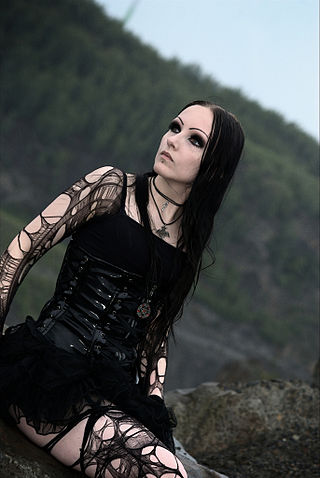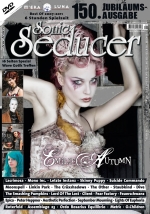
Goth is a music-based subculture that began in the United Kingdom during the early 1980s. It was developed by fans of gothic rock, an offshoot of the post-punk music genre. Post-punk artists who presaged the gothic rock genre and helped develop and shape the subculture include Siouxsie and the Banshees, Bauhaus, the Cure, and Joy Division.
Gothic rock is a style of rock music that emerged from post-punk in the United Kingdom in the late 1970s. The first post-punk bands which shifted toward dark music with gothic overtones include Siouxsie and the Banshees, Joy Division, Bauhaus, and the Cure.
Dark wave is a music genre that emerged from the new wave and post-punk movement of the late 1970s. Dark wave compositions are largely based on minor key tonality and introspective lyrics and have been perceived as being dark, romantic and bleak, with an undertone of sorrow. The genre embraces a range of styles including cold wave, ethereal wave, gothic rock, neoclassical dark wave and neofolk.
A rivethead or rivet head is a person associated with the industrial dance music scene. In stark contrast to the original industrial culture, whose performers and heterogeneous audience were sometimes referred to as "industrialists", the rivethead scene is a coherent youth culture closely linked to a discernible fashion style. The scene emerged in the late 1980s on the basis of electro-industrial, EBM, and industrial rock music. The associated dress style draws on military fashion and punk aesthetics with hints of fetish wear, mainly inspired by the scene's musical protagonists.
Hatesex is an American, Los Angeles–based goth rock band, founded by former Diva Destruction guitarist Benn Ra and vocalist Krisanna Marie.

Dark culture, also called dark alternative scene, is a mixture of thematically related subcultures including the goth and dark wave subculture, the dark neoclassical/dark ambient scene, parts of the post-industrial scene parts of neofolk and the early gothic metal scene. Dark culture's origin lies in followers of dark wave and independent music, but over the decades it has developed to a social network held together by a common concept of aesthetics, self-representation, and individualism. The musical preferences of the dark scene are characterized by a mix of styles ranging from gothic metal, to industrial dance music and dark ambient, to dark neoclassical, neo-medieval and dark folk music, to gothic rock, dark wave and post-punk, the darker ends of electropop.

In the Flat Field is the debut studio album by English gothic rock band Bauhaus. It was recorded between December 1979 and July 1980, and released on 3 November 1980 by record label 4AD, the first full-length release on that label. The cover artwork is a reproduction of Duane Michals' 1949 photograph, Homage to Puvis de Chavannes.
Ethereal wave, also called ethereal darkwave, ethereal goth or simply ethereal, is a subgenre of dark wave music that is variously described as "gothic", "romantic", and "otherworldly". Developed in the early 1980s in the UK as an outgrowth of gothic rock, ethereal wave was mainly represented by 4AD bands such as Cocteau Twins, This Mortal Coil, and early guitar-driven Dead Can Dance.
Ikon is a band from Melbourne, Australia. Ikon blends darkwave and post-punk music, following the footsteps of influences such as Joy Division and early New Order.
The LoveCrave is an Italian gothic metal band from Milan. The LoveCrave means "Hundredth Rave of Love". This name was taken from a story about a rave of vampires written by Francesca Chiara in 2003.
Jesus on Extasy is an electronic rock band from Essen, Germany, formed in 2005 by Dorian Deveraux and Chai Deveraux. The band's musical style can be described as a hybrid of rock and metal elements and electronic music. After breaking up in 2014, the band announced their reunion on their Facebook page in October 2020.
Lyriel are a German heavy metal band who formed in autumn of 2003 in Gummersbach. Originally playing folk metal, they turned more towards symphonic and gothic metal. Lyriel has recorded five studio albums and published a DVD of a live performance.
The discography of VNV Nation, an Irish electronic music project, consists of ten studio albums, two compilation album, three extended plays, and twelve singles.
Futurepop is an electronic music genre that has been characterized as a blend of synth-pop, EBM and dance beats, based on trance and techno.
Zillo was a German alternative music magazine, published monthly, originally edited by Rainer "Easy" Ettler. It was in circulation between 1989 and 2014. The headquarters of Zillo were in Lübeck.
Orkus is a monthly German music and culture magazine published by the Zoomia Media Group. Despite its subtitle and its web tagline, it includes all popular music genres including metal, medieval rock, Neue Deutsche Härte, alternative rock, electro and futurepop. The gothic rock, dark wave and industrial music genres have had only a minor presence since the late 1990s.

Blitzkid is an American horror punk band from Bluefield, West Virginia. One of the leading proponents of the horror punk scene, the band is led by singer/guitarist TB Monstrosity and singer/bassist Argyle Goolsby. Active from 1997 until 2012 and reforming in 2020, Blitzkid released five studio albums, appeared on numerous compilations, and toured both nationally and internationally.
The Breath of Life is a Belgian rock band.

Ash Code is an Italian dark wave band formed in 2014 in Napoli by the singer Alessandro Belluccio, the keyboardist Claudia Nottebella and the bass player Adriano Belluccio. Ash Code's music covers a wide range of genres including dark wave, post-punk, synth-pop and EBM.





